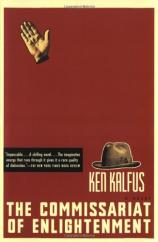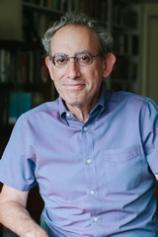Excerpt
Excerpt
The Commissariat of Enlightenment

Chapter One
1910
The train jolted forward so abruptly that the three passengers in the first-class coach sensed that they had been propelled much farther than a few meters from the Tula station. One of the men (Gribshin) felt as if he had been thrust from the era in which he lived. The second man (Vorobev) perceived that he had been jerked out of a manner of thought that had become complacent after years of discovery; now he was poised at the brink of revelation. The third man (Khaitover), who had been resting with his eyes closed, now sprung them wide, as if he had been suddenly brought to life. The three men had not yet made each other's acquaintance.
The initial surge bunched the cars, they paused in repose as the engine strained against them, and then the couplings tensed, there was another, now-anticipated jolt, and the train pressed forward again. The station's cream-yellow bricks slid past the window, followed by railway sheds and equipment of uncertain purpose. Leafless nearby trees crossed more distant ones. Patches of white, remnants of the first snowfall, dotted the hard fields.
The third man, who after a lengthy, restless, and intermittently ruinous residence in Russia now called himself Grakham Khaitover, his name Cyrillicized into something outlandishly guttural, scarcely noticed the first man, Gribshin, who was young and Russian. Of the second man, sitting opposite him, Khaitover remarked only a faint chemical, fungal scent, indefinitely disturbing but not unpleasant. At this crucial moment -- but why was it crucial? why had the fog into which he had dozed not yet cleared? -- the odor seemed pregnant with a message he could not read.
The second man, Professor Vladimir Vorobev, ignored the first man as some clerk or student, destined to be banished to a green third-class car once the conductor checked his ticket. If Vorobev had been told that Gribshin would someday make a revolution, he would have shrugged and replied that he was a scientist completely uninterested in politics. This practiced denial would be developed into an argument of contemptuous disinterest by the time he reached Bulgaria, years later, after fleeing there with former elements of the White Army, and then modified again into one of innocent apolitical ignorance once he returned to the Ukraine at the end of the Civil War.
The revelation that had just come to Professor Vorobev had to do with the specific gravity of certain liquid substances, particularly glycerin in respect to distilled water, and then again in respect to the specific gravity of human blood. The other substance to be taken under consideration was potassium acetate, a compound typically used in fabric conditioner.
Tula's outlying settlements glided past, followed by snow-frosted small cottages, grain silos, the brown dome of a village church, and a tableau of peasants frozen in time, leaning away from their carts, against the direction of history. Professor Vorobev turned his attention toward the third man, Khaitover, who was clearly a foreigner. Khaitover was gangly and fair, with a small, yellow mustache. The professor noted the failings of his toilet: the wrinkled business suit; the light, uneven side whiskers; the scuffed shoes; the drowsy demeanor. As the train picked up speed, rocking through the countryside, the foreigner's head fell against the mud-specked window and his eyelids began to flicker.
Vorobev cleared his throat, as if in a lecture hall, and inquired:
"Sir, are you a pilgrim, or a journalist?"
Khaitover opened his eyes, but remained leaning against the window. The professor fairly glowed with the benevolence of his question. Khaitover responded in heavily accented, grammatically awry, snarly Russian.
"Do I look like a bloody pilgrim?"
"There are many pilgrims from abroad. Germany, England, America, India. Some have come on foot."
Vorobev offered Khaitover his card, obliging the foreigner, grimacing, to dig one out of his own billfold, which itself had to be excavated from an inside jacket pocket. His living dependent on more than a single occupation, Khaitover carried a variety of cards. He made a selection and gave it to the professor. He kept his shoulder jammed against the window.
The first man, who at twenty years of age was still called Gribshin, attended the exchange with vague interest. The impulsion forward had left him chiefly occupied with an inventory of the physiological effects induced by accelerated time travel: a retrograde churning of your stomach contents, a searing of your nostril hairs, a sharpening of vision that brought the landscape into almost unbearable relief. You rarely experienced these effects in ordinary life, when you traveled into the future a single moment at a time. Gribshin wondered what new world he found himself in.
Vorobev squinted through his pince-nez, studying both the English and Russian sides of Khaitover's visiting card. The professor was a squat man with a round, sweaty face onto which a glossy black mustache seemed to have been clumsily pasted.
"The Imperial. I'm not familiar with it. Is it an important publication? What class of person is likely to purchase it?"
Khaitover replied, "The newspaperless class; that is, that class of people who do not have a newspaper and are desirous of reading one."
He hardly knew more about the paper he wrote for than how much it paid by the column inch. He had been away from England a long time, barren years in which he had ceased to be a young man as he sought to pry his fortune from this impossible empire and its limitless, valueless steppes, its inaccessible forests, its untappable mineral veins; its teeming, unfished rivers, its lazy and superstitious natives -- this hyperborean Congo. Or perhaps he had just been born, like today's newspaper, which had arisen from dust and telegraphic sparks in only twenty-four hours. Or he was only tired: he had just been involved in some very complicated speculative business having nothing to do with journalism.
Excerpted from The Commissariat of Enlightenment © Copyright 2004 by Ken Kalfus. Reprinted with permission by Ecco, an imprint of HarperCollins. All rights reserved.
The Commissariat of Enlightenment
- paperback: 304 pages
- Publisher: Harper Perennial
- ISBN-10: 0060501391
- ISBN-13: 9780060501396



